Even though edu backlinks aren’t as hot as 10-15 years ago, for many SEOs, they’re still the link-building holy grail.
But—let’s face it—they aren’t the easiest links to get.
In the article, you will discover 10 proven tactics to get powerful backlinks from .edu domains for your website.
We also answer a few commonly asked questions about .edu backlinks to give you all the knowledge you need to target them successfully.
10 Ways to Get Edu Backlinks
Without further ado, let’s dig into the link-building strategies that will help you get edu backlinks.
To make this section as useful as possible, I interviewed 6 experienced SEOs, link builders, marketers, and PR professionals, who shared their insights and case studies.
1. Analyze your competitors’ links
Competitor analysis is where you often start the link-building campaigns; it’s a kind of springboard for other tactics.
The reason?
You can quickly identify the institutions offering backlinks and the resources that can get you one.
To do it in Ahrefs, enter the competitor’s domain in the Site Explorer, and in the Backlinks report filter the results by those containing “.edu” in the Referring page URL.
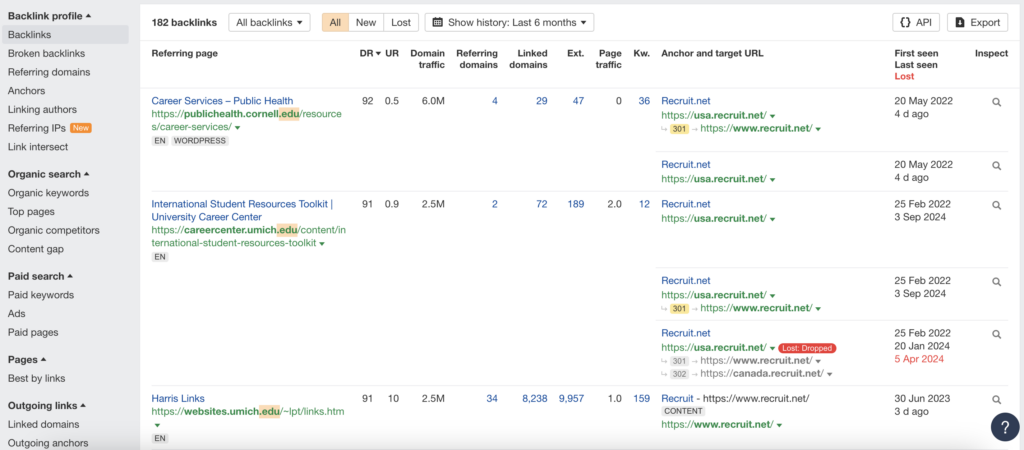
That’s how Seth Nichols, Ditto Digital's SEO executive managed to secure 15+ edu backlinks for a Hong Kong-based recruitment portal, Recruit.net.
These included links from DR70+ sites like salisbury.edu (DR73), nmu.edu (DR74), jmu.edu (DR80).
Best part?
It was a low-effort campaign: the outreach was fully automated and included little personalization.
2. Get listed on a resource page
Most of the backlinks that Seth secured for their client were on institutions’ resource pages.
This seems to be one of the most effective ways to acquire edu backlinks.
Julian Hooks, the CMO and SEO Director at Contractor Lead Partners, used the tactic to build multiple backlinks from educational institutions.
His campaign started by creating a comprehensive guide to healthcare careers, which turned out to be a solid link magnet.
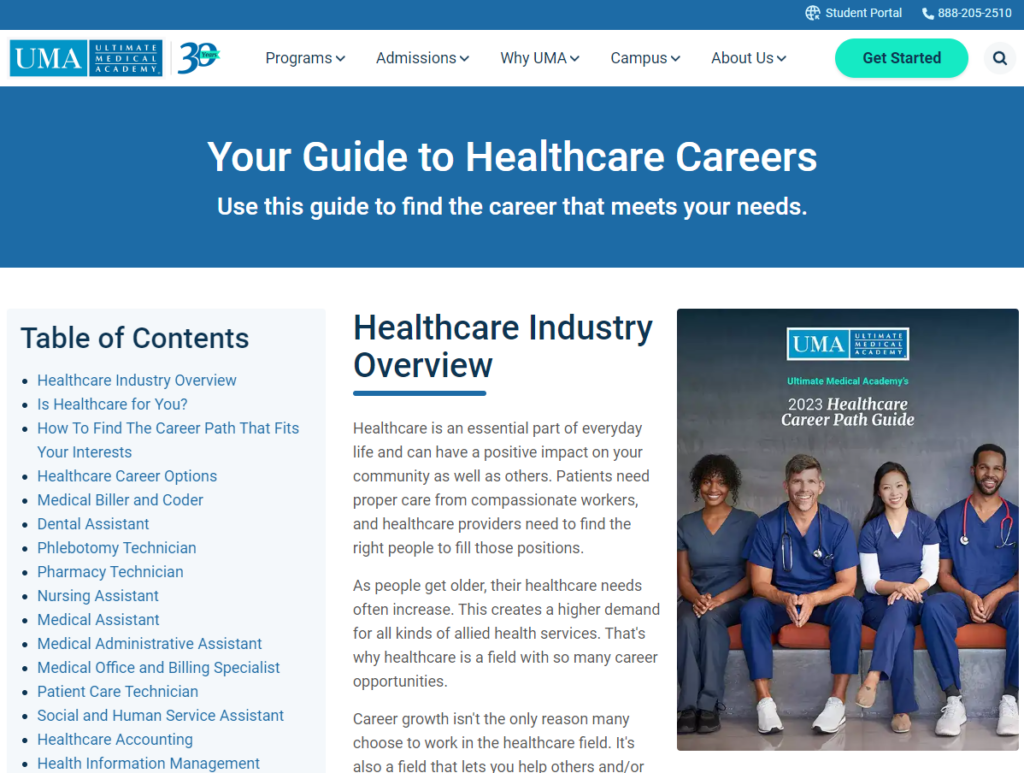
An outreach campaign followed. They contacted high schools and colleges and asked them to include it on their resource pages. Many did, and the links did their job:
The links were definitely worth it, as this article ranked #1 for the term “healthcare careers” for several years. It also brought it lots of leads and converted students.
How do you find such resource pages? Besides competitor analysis?
Use advanced Google Search operators. Here are a few combinations:
- careers intitle:resources inurl:.edu
- careers intitle:links inurl:resources.html
- careers inurl:.edu/resources
- careers inurl:resources inurl:.edu intitle:resources
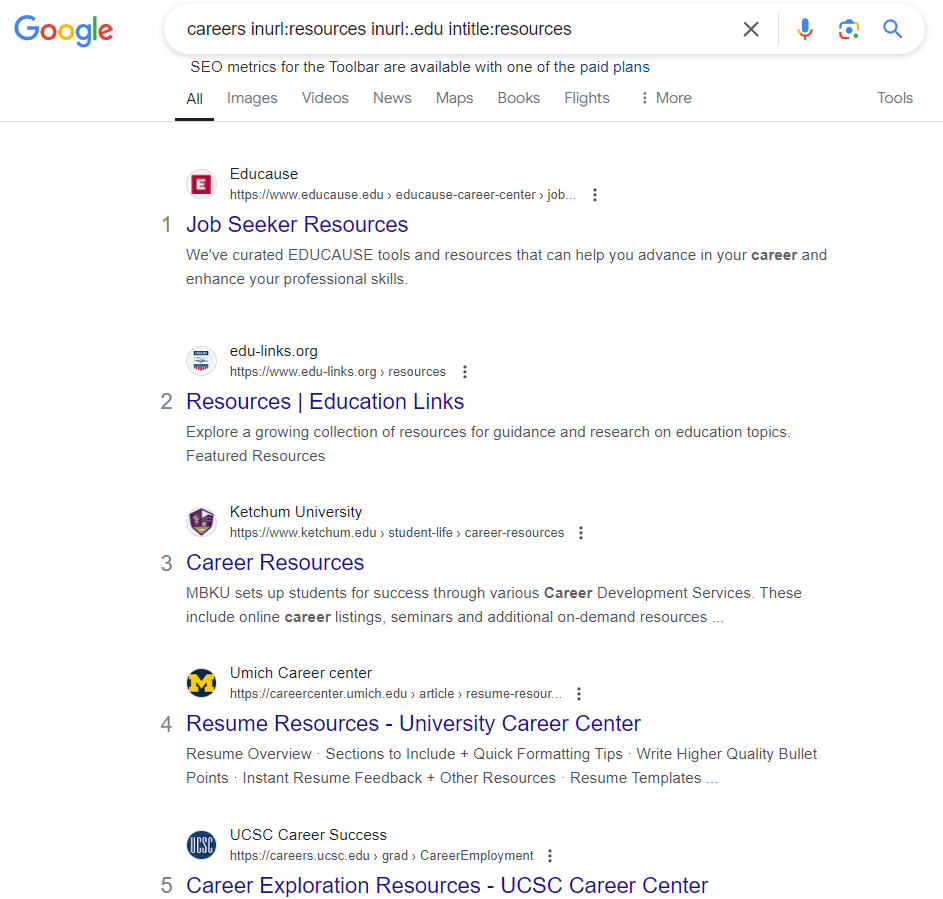
3. Use broken link-building
Broken link building is a popular tactic that you can leverage to get .edu links just like any other.
Here’s how it works:
You scan the website of an edu institution for dead links. Once you find them, you reach out to the webmaster and offer your link as a replacement.
Broken links on your site are bad for SEO because they spoil the user experience. So, by letting webmasters know, you offer value upfront, which is always a good way to start a new link-building relationship. And they might link to your site in exchange.
SEO tools like Ahrefs or Semrush have broken link reports, so finding them isn’t difficult.
But you can’t just enter the institution’s website URL, as you will be swamped with tons of irrelevant broken links. So be strategic and look for specific pages, such as career resource pages.
To find them, use search operators site:.edu (resources AND careers) or site:.edu (resources OR links AND careers).
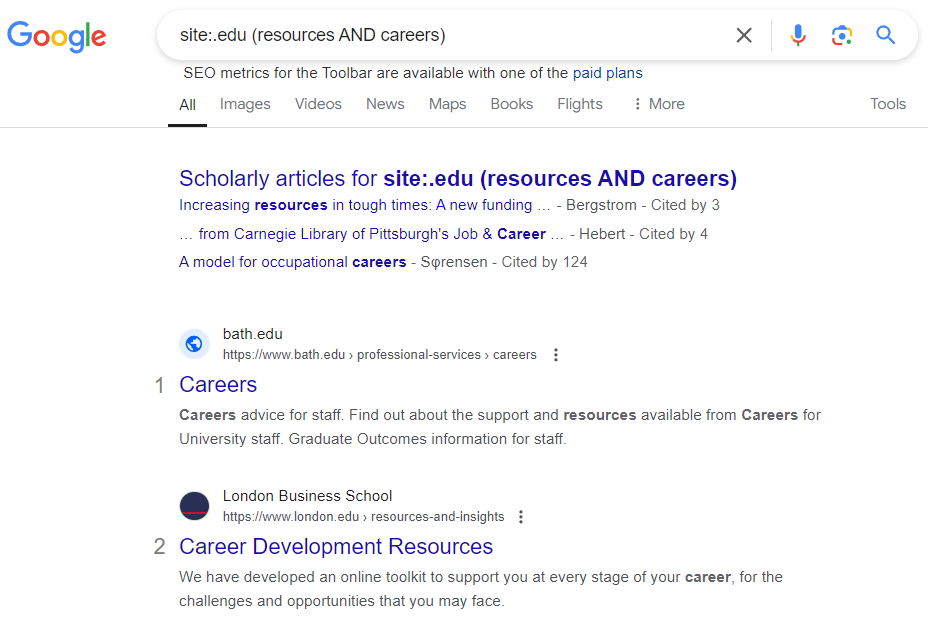
Next, plug each of the relevant pages into your tool, and only then look for broken links.
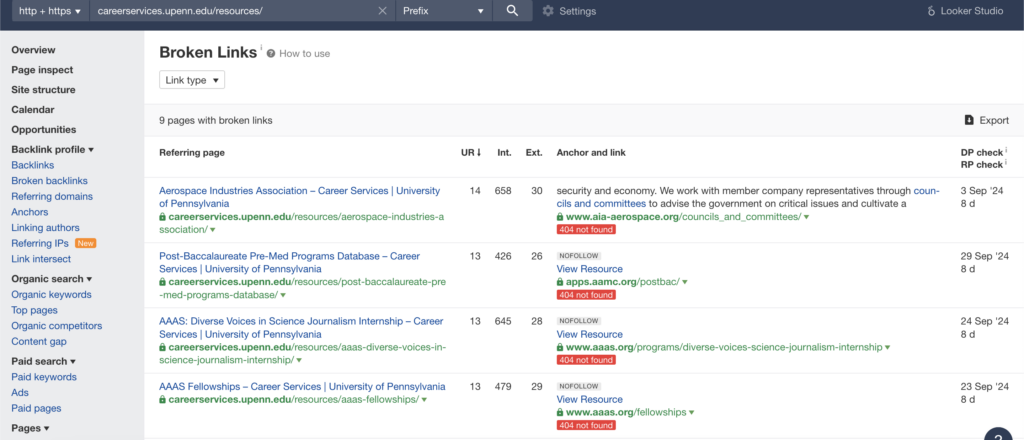
If you have resources that are a good replacement for the dead links, that’s easy.
If not, use Wayback Machine to see what the defunct page looked like and replicate it.

This may sometimes be quick and easy. And sometimes—tedious and impractical. So, weigh it up and decide if the link is worth the effort.
4. Create a scholarship for students
Funding scholarships for students is another proven strategy:
You offer to sponsor the education of young people, and educational institutions advertise it on their websites and link back to yours. You may also get additional mentions when you award the scholarship to one of their students.
I had a chat with Deyan Georgiev, the Marketing Manager at Rapidseedbox, who told me about their scholarship program for computer engineering students.
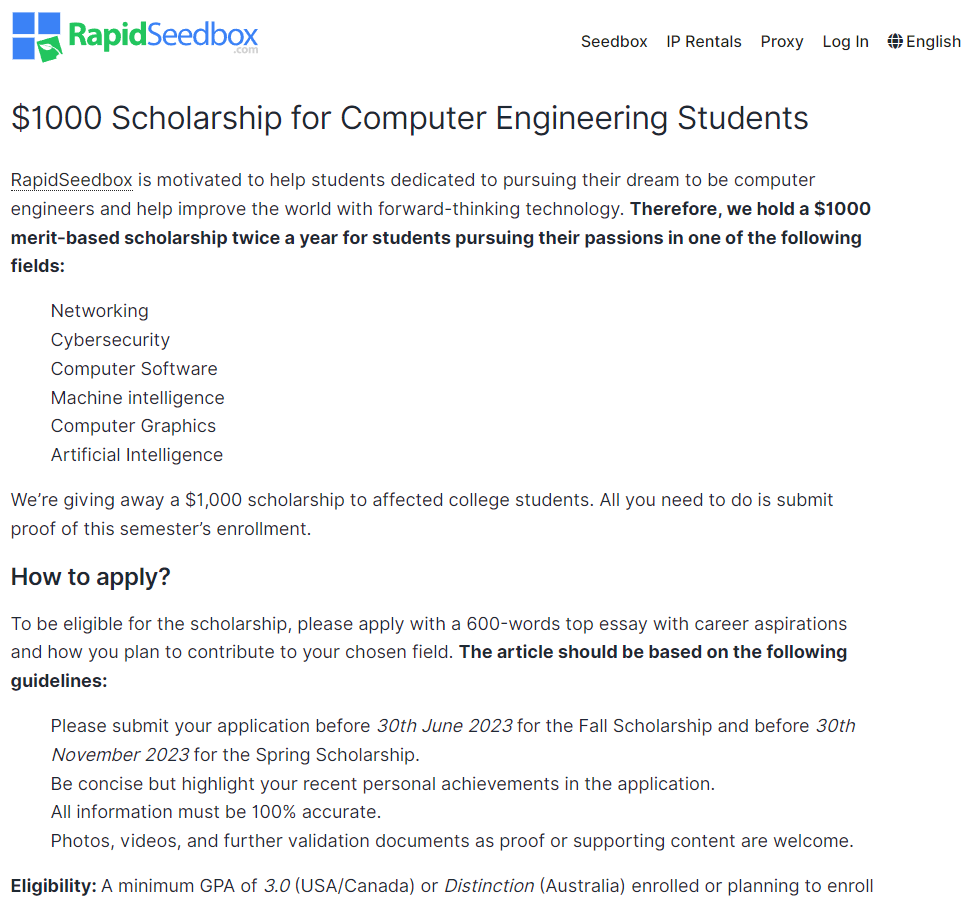
This helped them secure backlinks from organizations like the University of Connecticut (DR86) or Robert Morris University (DR69).

Want to know the real kicker?
The links were acquired organically; they didn’t do any outreach whatsoever because backlinks weren’t their goal.
If you’re after backlinks, though, we definitely recommend orchestrating an outreach campaign, like the one conducted by Time and Space for one of their clients, who funds a scholarship for business students.

However, Alex Moran, the SEO Lead at Time and Space, has noticed that this strategy may lose its effectiveness because many universities have stopped posting scholarships on their websites and use 3rd party portals instead:
Over time we have noticed more universities have moved off posting up the scholarships themselves (assuming this is due to the maintenance of ensuring they are all up to date) and instead have moved toward using portals such as We Make Scholars.
The trend appears to be that long term, these .edu links will be harder to get if we went and outreached to them again.
5. Create a careers page
If funding a scholarship isn’t feasible, you can support students by offering them other opportunities, like internships. And get backlinks in the process.
The principle is simple:
You build a jobs page on your website listing all the available opportunities and your requirements, like the qualifications of an ideal candidate.
Next, reach out to colleges and universities that have careers pages and let them know about your job or internship listings.
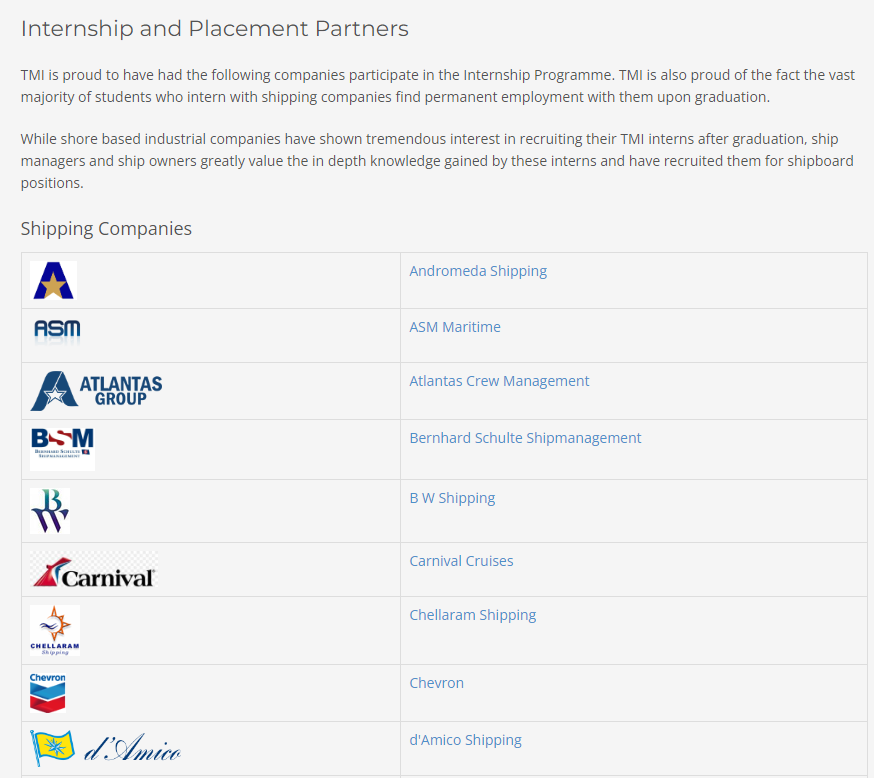
The easiest way to find them is with advanced search operators. Here are a few examples:
- site:.edu "internship partners"
- site:.edu "submit a job posting"
- site:.edu "internship program"
- site:.edu "apply for an internship"
- site:.edu "partner with us"
- site:.edu "corporate partnerships"
- site:.edu "external partnerships"
- site:.edu "become a partner"
- site:.edu "partnership opportunities"
- site:.edu "industry partners"
- site:.edu "internships"
- site:.edu "internship opportunities"
- site:.edu "job board"
- site:.edu "employment opportunities"
- site:.edu "job postings
Again, many institutions are turning to 3rd-party job boards like Workday or BambooHR to manage the listings, so you may not always score a link this way.
For example, Warren Wilson College uses Milkshake as their career platform, so you wouldn’t get a link from them.
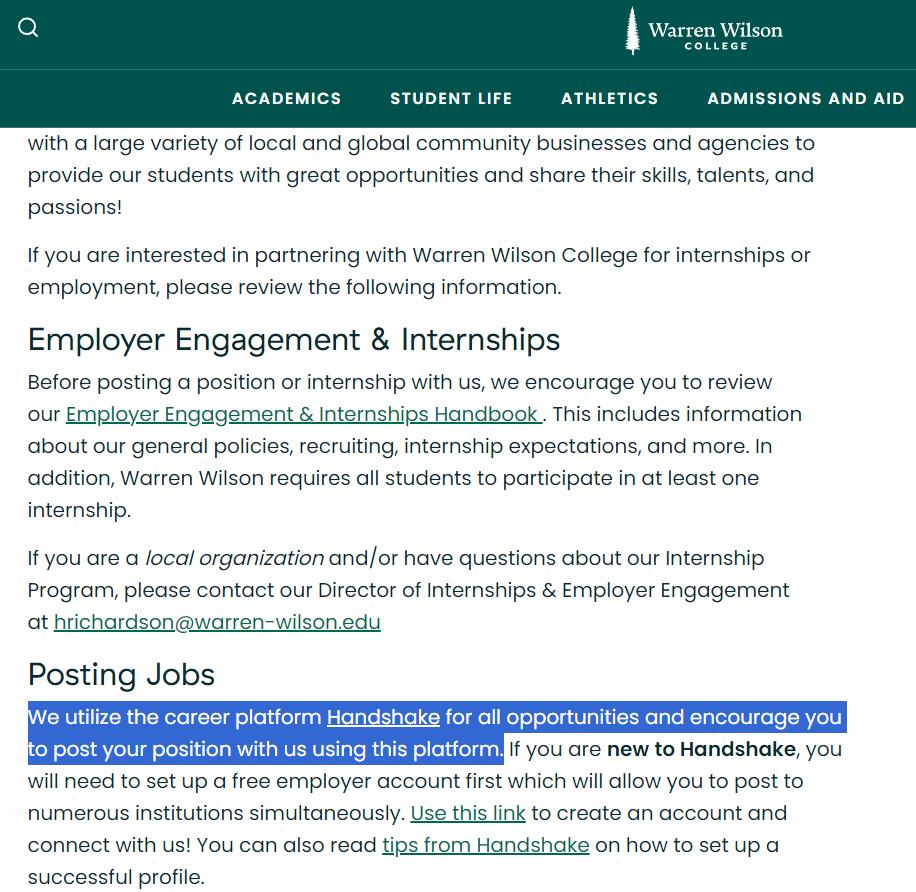
6. Provide discounts to staff & students
Another way to get links from edu sites is to offer discounts to their faculty and students. This not only gives you links but can send potential customers your way.
Many organizations have dedicated pages where they list available discounts. You can find them using search operators like:
- site:.edu “student discounts”
- site:.edu “staff discounts”
- site:.edu “discounts”
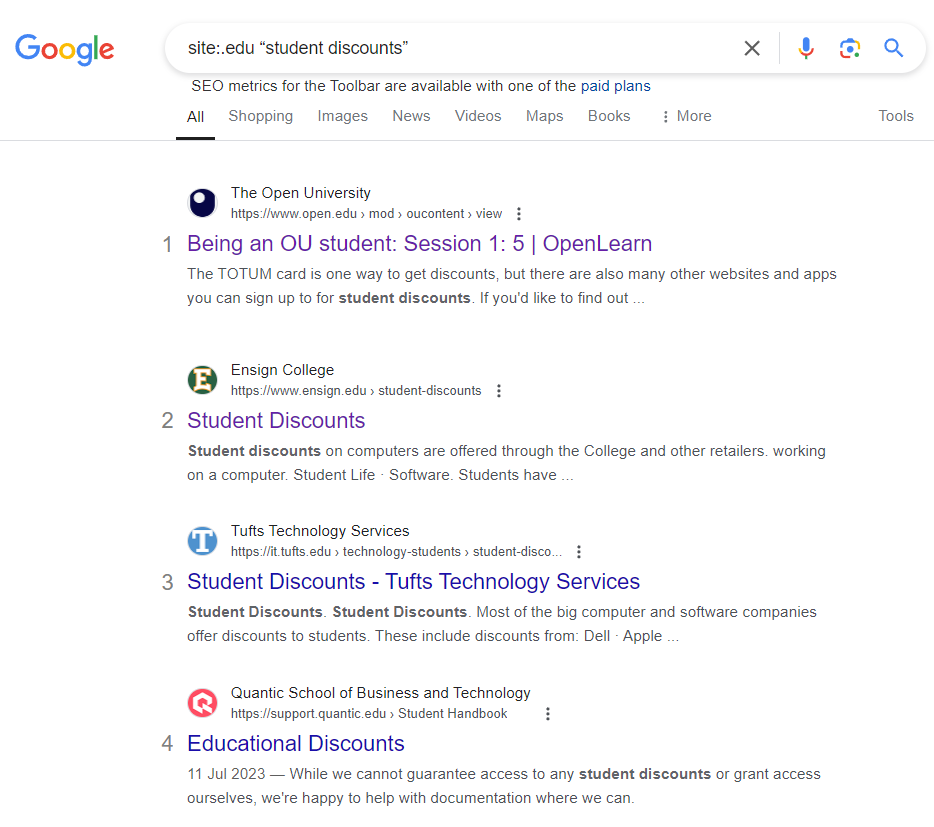
This strategy is particularly suitable for online retailers and SaaS companies. That’s because their offerings are relevant no matter where the educational institution is located.
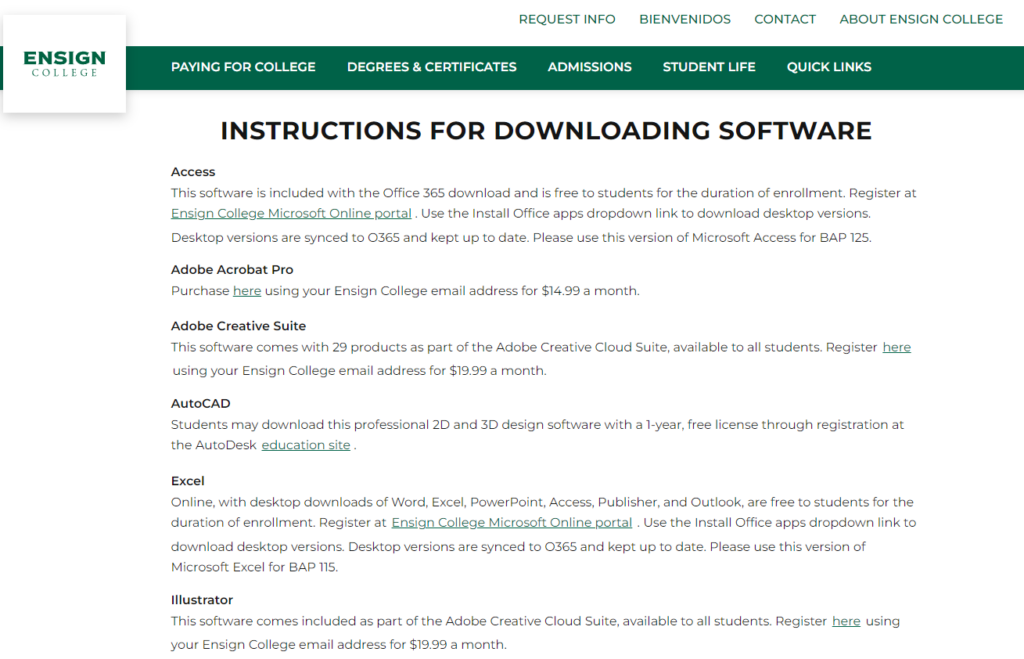
Other businesses can use it too—to boost their local SEO performance but their options may be a bit more limited, depending on you’re based.
7. Offer tools to students for free
Software companies can go one step further and offer students access to their tools free of charge.
This could be a wider-scale deal, like the one Zoom offered to educational institutions during the COVID-19 pandemic, or to support individual students.
That’s how Mention, the social listening platform, acquired a link from Stanford.edu. They allowed one of its students to use their tool for free to collect data for her research, and the student mentioned the tool in her paper as she described her research process.
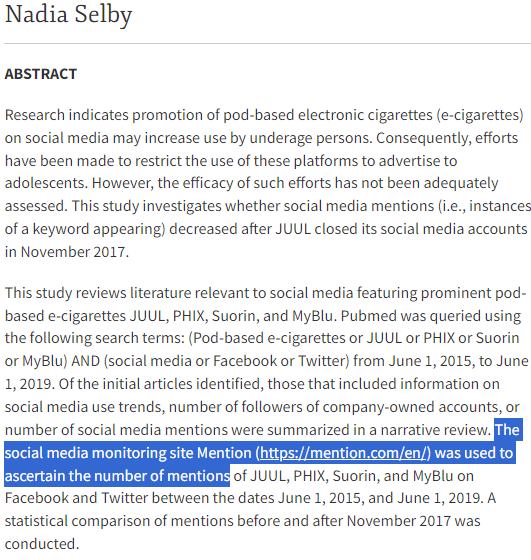
For SaaS companies, this costs nothing, as Lucas Carval, Growth Specialist at Mention, points out, but there’s no guarantee you get the link:
Giving free access to a student didn’t take much effort, but it secured us a link to one of the biggest .edu sites online. It was well worth the effort. However, the link isn’t guaranteed so you never know whether they’ll just use your tool for free or not.
Also, supporting individual students isn’t scalable and is more of a passive tactic. This particular student approached Mention herself.
8. Collaborate with college newspapers and magazines
Many colleges and universities run student newspapers and magazines. This gives aspiring journalists an opportunity to get practical experience in the trade.
College newspaper or magazine journalists don’t differ from other journalists; they also need insights from industry experts to enhance their articles.
And that’s your chance to get a juicy backlink.
There are two ways to get them: by responding to callouts on services like HelpB2BWriter, Qwoted, or Featured and through digital PR campaigns.
9. Interview faculty members
Interviewing staff members is another way to get high-quality links from their university profiles.
Here’s an example of such a profile of one of the Point Park University professors listing all her news appearances.

See the highlighted link?
It’s from an interview conducted by Sixth City Marketing.
Sarah Blocksidge, the agency’s Marketing Director, finds faculty interviews particularly effective at securing backlinks. Especially email interviews, because they require relatively little effort and still offer high rewards.
Sarah’s agency also hosts a podcast—The Prof Podcast— where they interview popular academics, but she admits this is a ‘high effort, low reward’ tactic.
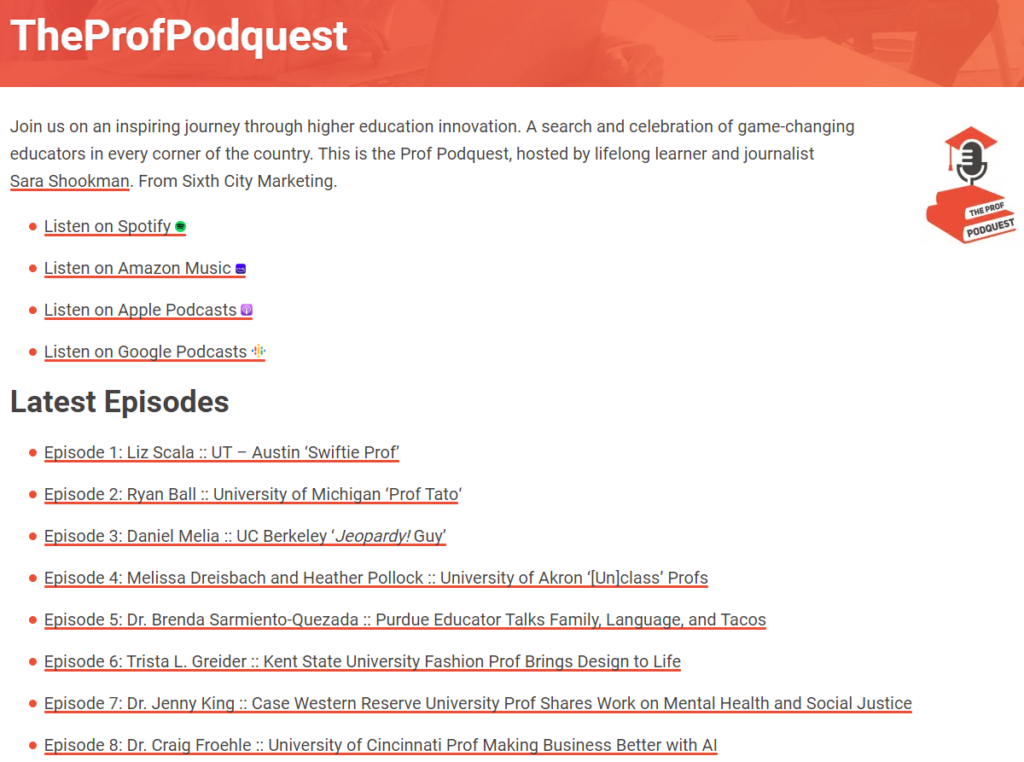
10. Get featured on alumni pages and directories
Many educational organizations help their alumni by running directories where they can list their businesses.
Here’s an example of such a directory on the IE University website (DR78) which offers dofollow backlinks. That’s an easy win!
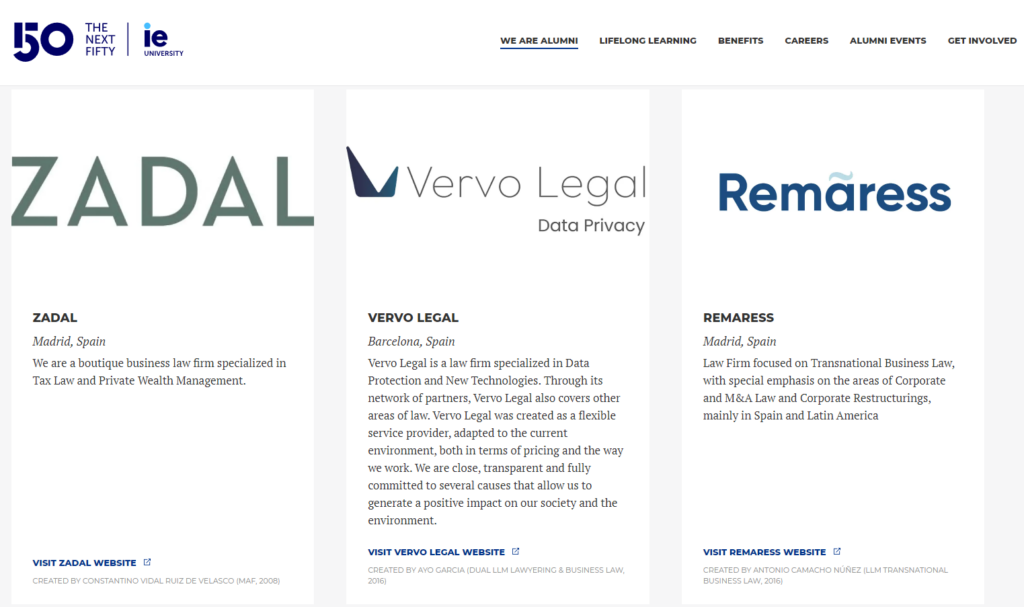
You may also find opportunities to get featured on your university and college alumni associations’ pages hosted on .edu domains. Educational institutions are always keen to share their students’ achievements because they increase their prestige and provide social proof.
What kind of news is worth sharing?
- Interesting projects you’ve been involved in;
- Events you’ve organized;
- Case studies and research reports you’ve published;
- Awards you’ve achieved.
Here’s an example of an article about two renowned graduates on the Princeton University alumni page, where they link to their business website.
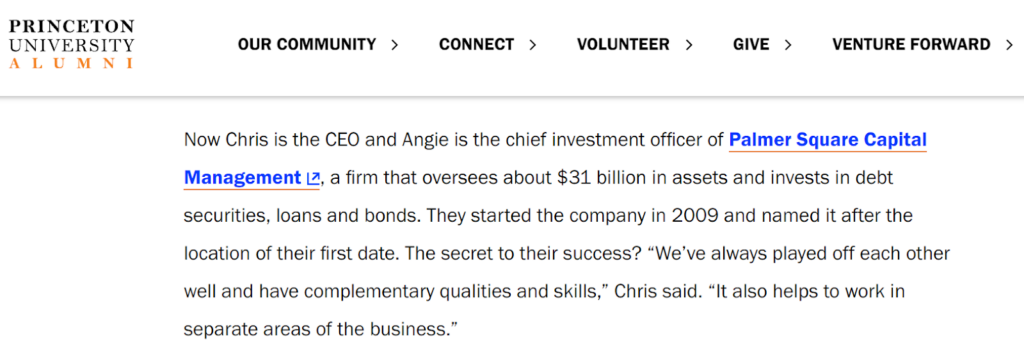
Can You Buy Edu Backlinks?
Most of the tactics above require some effort and resources. That considered, you look at buying .edu backlinks instead.
Is it possible at all?
Yes.
You can find plenty of such deals available on freelancer platforms like Fiverr, Legit, or Upwork. For example, here are three offers that give you 20-25 edu backlinks for under $50 quid.
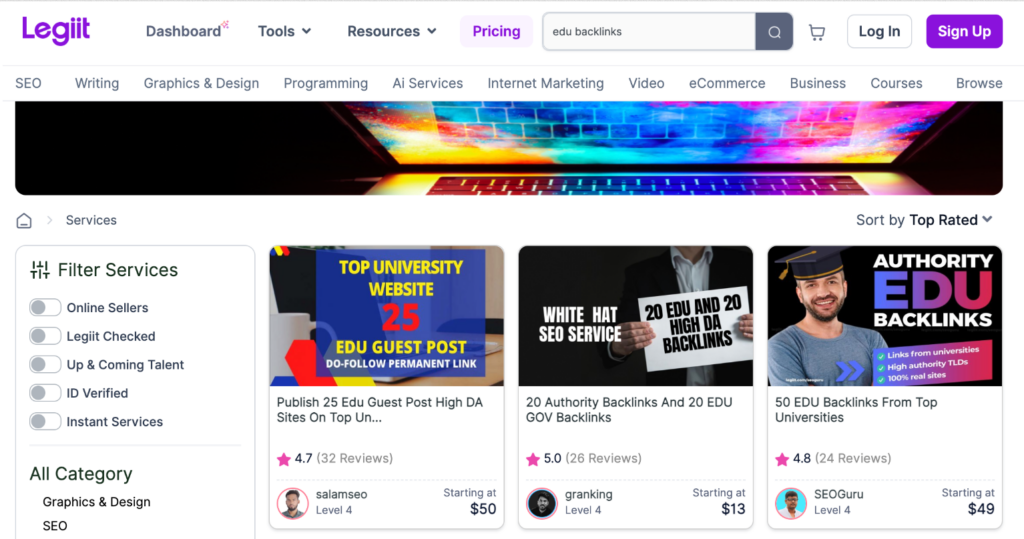
It seems like a bargain, but from our experience, they aren’t worth even that much. The links often come from forums and random pages that sometimes aren’t even indexed by Google.
And even if they were of any value, remember that buying links is a violation of search engine guidelines. And they’re increasingly better at detecting unnatural and spammy link acquisition patterns.
That’s why we advise against buying links and encourage businesses to acquire them using white-hat tactics.
Frequently asked questions about edu backlinks
To finish, let’s deal with a few questions that we often hear.
What are Edu backlinks?
Edu backlinks are inbound links from domains that belong to educational institutions—universities, colleges, schools, or research institutes.
Because not many organizations have access to the .edu domain, these kinds of backlinks are relatively rare, and the competition for them is fierce. Which means they’re difficult to get.
Are Edu backlinks good?
The short answer is yes.
Edu backlinks can improve your SEO performance because they usually come from high-authority domains.
For example, the Harvard University website has a Domain Rating of 93.
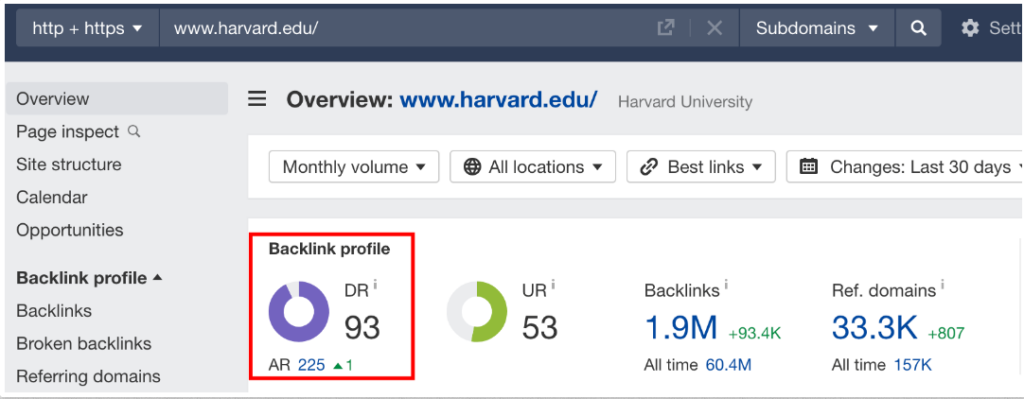
What’s more, educational websites are quite picky about who they link to, so they tend to have a very good inbound/outbound link ratio.
This means they pass more link equity to your site than other websites with similar DR.
However, if you had two websites with identical metrics and one of them was from a .edu site, the link wouldn’t be any better.
I personally don’t think there is anything special about them. While .edu sites often have good metrics, this does not mean that a .edu link is extra powerful compared to a link with any other TLD.
There’s another catch:
Backlinks from educational institutions may not always be relevant to all businesses. And this can dilute their impact on your SERP performance.
So you need to consider if the potential gains justify the effort needed to get them.
What are the pros of edu backlinks?
Websites with a .edu domain extension typically have high domain authority.
This is down to two factors.
First, content on university sites is usually of high quality. Think about the rigorous process you need to go through to have your research paper published in a peer-reviewed journal!
So search engines view them as reliable and credible sources of information.
And not just search engines: their content is cited by other reputable institutions like government or academic organizations. Which means they usually have strong backlink profiles.
So when a high-authority EDU site links to your website, it makes your website look more authoritative too. And, consequently, helps its performance in search results rankings.
Especially as you can’t really manipulate these sites for SEO purposes–they don’t sell links or get involved in link exchanges.
This also means that edu backlinks are more difficult to replicate. You really need to earn them. As a result, they’re a chance for your business to stand out from competitors.
What are the cons of edu backlinks?
Edu backlinks aren’t always as brilliant as many seem to believe. Their main downsides include:
One major drawback of EDU backlinks is that they are difficult to earn for many industries.
Educational institutions typically focus on academic or student-related content, which may not always align with your niche. And irrelevant links may not benefit your site as much. What’s worse, they may bring your rankings down.
As mentioned, acquiring EDU backlinks can also be resource-intensive. For example, funding scholarships or providing free resources is costly, and collaboration on research projects takes lots of manpower and time which you could be using on other more profitable projects.
That’s why getting .edu links shouldn’t be your primary goal but rather a nice byproduct of other initiatives to advance high-level business goals. Nobody offers internships to get links but to recruit top talent that drives growth in the future.
Finally, while EDU backlinks are generally seen as valuable, getting one doesn’t necessarily guarantee better performance in search rankings. They need to be a part of a wider SEO strategy and other links may deliver similar results.
Wrapping Up
Edu backlinks are some of the most coveted ones and are often seen as synonymous with high quality. Universities, colleges, and schools don’t give them away to just anyone, which makes them seem particularly valuable.
However, the reality is that they’re just like any other links from high-authority websites. And because they’re more challenging to get, they’re not always worth the resources invested in their pursuit. A link from another site with similar metrics is usually easier to acquire.
At Editorial.Link, we have lots of experience securing high-quality backlinks from sites like Forbes and Hubspot. If you’d like to beef up your backlink profile with such links, get in touch.





